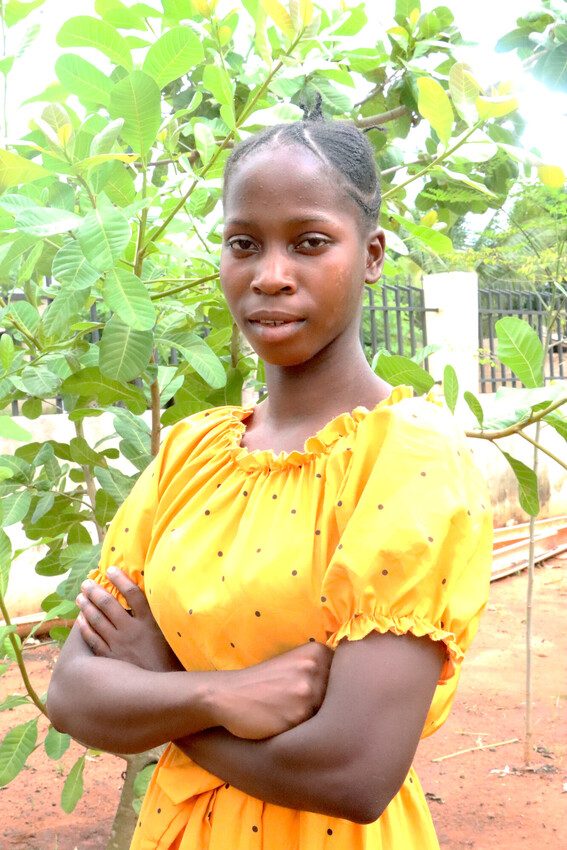Julieta: community peacebuilding in Mozambique
Julieta uses mediation skills to resolve disputes in her community, and support girls and children dealing with conflict by teaching peace, democracy and human rights.

Eighteen-year-old Julieta, from Cabo Delgado province in Mozambique, has experienced the horrors of conflict many times. Born in Muidumbe district, she has been displaced several times by the conflict that began in 2017, moving first to Mueda and later to Chiúre district, where she now lives in an internally displaced person (IDP) resettlement centre with her husband and daughter.
Julieta has learned mediation skills, the importance of peace and her basic human rights. She uses this knowledge to intervenes in disputes between people in her community.
Peacebuilding and mediation
Julieta explains, “I started attending peacebuilding training out of curiosity. I saw the work that Plan International was doing in the resettlement centre and I thought I could learn and apply that knowledge.”
“I learned a lot about conflict and how to deal with it, about peace, leadership, democracy and human rights. It takes a lot of patience and determination to do this kind of work.”
“I have had to intervene in several conflict situations, involving other displaced people like me and the host communities. There is always a lot of tension and me and other people with some training raise awareness on both sides. Language is often a barrier because we don’t speak the same language, but we always find a way to manage conflicts.”
“For example, because of the food aid we receive from NGOs, the host communities are no longer willing to help us with food. They say we have already received help and if we want their help or food, we have to pay. Many communities even say that we are not fleeing war, we are fleeing hunger and we want them to run out of food too.”
Julieta focuses on girls and children dealing with conflict
“I believe that we women have a crucial role to play in building the peace that we all want so much.”
Julieta
“I have faced several challenges when giving talks and advice on peacebuilding.
“Conversations with adults often don’t go well because the context we are in is very stressful and people don’t want to have those conversations. My approach then is to focus on other girls and children. I give them advice on how to deal with conflict, what their rights are and how they can get help if something more serious happens to them, such as some form of abuse.
“I remember a very recent case where 2 children of the same age were fighting over food. The father of one of the children showed up and attacked the other child. It was a very ugly case and the only reason it didn’t escalate further was because we intervened.”
“Myself and some other people went to talk to the abusive father about the seriousness of what he had done and let him know that it was not the right thing to do. After several discussions he realised he was wrong and we convinced him to take the child home and apologise to her parents. Although reluctant, he did so and we used the opportunity to give a talk to everyone involved, including the parents of the abused child and other members of the community.”
“Being a woman in this context of war is very hard. There are all kinds of difficulties, but I believe that we women have a crucial role to play in building the peace that we all want so much.”
“I use what I have learnt in the talks I give to girls and children in the community. We sit down and talk, cases are shared and I give advice based on what I have learnt. I hope that one day I can work for an NGO and help others with this kind of activity.”
“I stopped going to school because of the conflict and have moved from place to place several times. If there is peace, I would like to go back to my community first. It would make me very happy because I could meet people I haven’t seen for years. Peace in Cabo Delgado would mean a chance to start again and to have our lives as they were before.”
“My approach then is to focus on other girls and children. I give them advice on how to deal with conflict, what their rights are and how they can get help.”
Julieta
Displacement in Mozambique
Northern Mozambique has been experiencing armed violence since 2017, affecting more than half a million people who have been displaced from their homes. Since 2021, Plan International has provided assistance to more than 145,484 people displaced by the conflict, including 55,493 girls, 51,625 boys, 21,603 women and 16,736 men.
In Mozambique’s IDP camps and resettlement centres, people face many difficulties, including hostility from host communities, who often prevent them from accessing fields to grow crops and forests to collect firewood.
To help defuse growing tensions between IDPs and host communities, Plan International implemented a peacebuilding project, to train young people in mediation skills so they could intervene in camp and host community disputes and bring about an agreement or resolution. Supported by UNHCR, 129 young people (70 female and 59 male), including Julieta, participated in a five-day training session between October and November 2022.
They learned a wide range of peacebuilding skills based on a human rights framework. Participants learned about different tools, interventions and strategies for conflict resolution, how context and perspective affect the peacebuilding process, how to de-escalate tensions and how to build a culture of peace.
Since the training, young people are developing promotional materials, conducting awareness sessions and creating posters with messages of peace to help IDPs and host communities learn how to live and work together.
Categories: Emergencies


